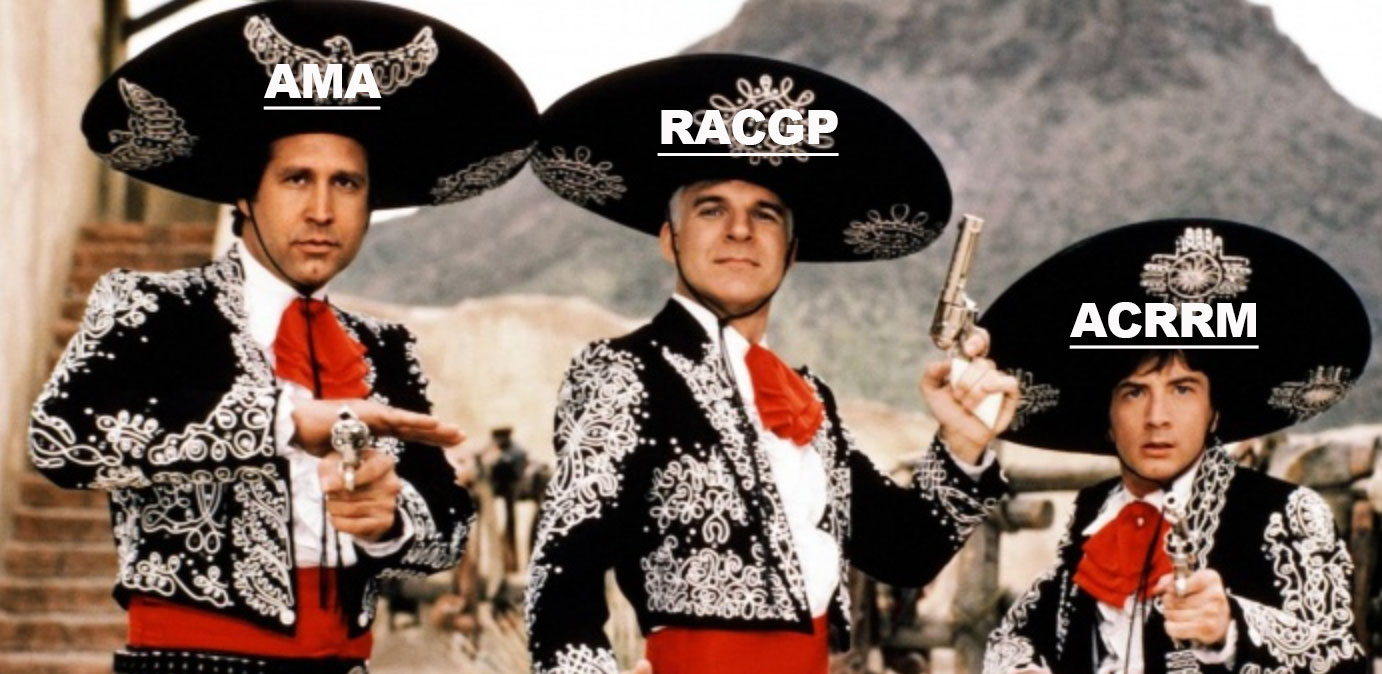The RACGP, the AMA and ACRRM should never had taken part in the Queensland pharmacy trial, even if they had no idea where it was heading to start with.
News this week that the RACGP, the AMA and ACRRM knew about the intent of the Queensland Department of Health (QDoH) to conduct some sort of prescribing trial for pharmacists in that state as far back as January 2021 should have come as a shock to most GP members of each group.
Until last week, most of us were under the impression that these groups had learnt about the trial only when we did, were horrified, and had thus put out public statements to that effect.
But the RACGP, the AMA and ACRRM had been involved in the prescribing trial more than a year before it got publicly outed by Australian Doctor a couple of weeks ago and made their statements of objection only once it was outed.
Why would all these groups be keeping stuff like this secret from their members?
According to a report in Australian Doctor, the groups’ involvement in the plan started as far back as January 2021, when the QDoH decided to form a steering committee to “offer strategic oversight and advice to design, implement and evaluate a community pharmacy pilot that would run from March 2021 to December 2023”.
Detail on what the pilot would be about was not available back then but it was clear the pilot was going to examine extending the “scope of pharmacists”.
Extending the scope of pharmacists into prescribing has been a very clear objective of the Queensland Pharmacy Council, which was established by the QDoH in late 2017, and was running the proposed trial.
And there was already a controversial pharmacy trial in play for prescribing to treat UTIs.
It’s doubtful any of these groups could have guessed the bold scope the QDoH was eventually going to reveal for the trial, but it must have known they were on board something that was very likely to be dodgy.
With just three GP voices in a 19-person committee and the history of decision-making of the Queensland Pharmacy Council, which has been pro pharmacy and pharmacy prescribing since its inception, it must have been a short bet for all the boards of each group, and even their executives, that when the detail on the trial eventually became clear, it wouldn’t be pretty.
And that they would be seen to be part of it.
According to the RACGP the AMA and ACRRM, they chose to each put a member on the steering committee, with a view to getting more information on what the Guild and the QDoH were up to.
The Queensland president of the RACGP, Dr Bruce Willett, told The Medical Republic last week that the reason for this was to stay close to the project in order to be able to expose it if patient safety was going to be compromised.
There is certainly some grey in how pharmacists and GPs work together in terms of extending pharmacy scope to genuinely provide the community with better access to care at less cost to the system.
Pharmacists can and should do some things that GPs do now or have been doing exclusively. Being involved in certain vaccine programs is an important and recent example of extending pharmacist scope for the greater good.
To their credit, perhaps, the RACGP, the AMA and ACRRM seem to actually be committed to this dynamic to some extent. They look they want to work with health departments in good faith to help find the optimal line between the professions and better patient experience.
But on the other side of the fence, the Pharmacy Guild and the PSA (Pharmaceutical Society of Australia), haven’t been thinking about good faith or playing fair and that’s been very obvious for a long time now.
They are playing a game with any government department that will play with them (Queensland seems unusually receptive) with a view to increasing the scope of pharmacists for commercial reasons first, with patient outcomes a distant second or even third in their thinking.
These organisations can’t mount a cohesive argument otherwise.
The Queensland pharmacy prescribing pilot is naked in its ambition to give pharmacists a foot in the door on prescribing for commercial reasons first. The trial design has patients paying more for medicine, and a fee for consultancy, and ignores the conflict of a prescriber of drugs being a seller of drugs, and all the safety implications of a busy and under-trained pharmacist trying to diagnose complex chronic conditions.
Even pharmacists started questioning the pilot and the intentions of the Guild this week.
“Without capacity to order pathology, radiology, conduct fully trained examinations, how can you hope to safely and accurately diagnose what a GP does in a day?” a salaried pharmacist commented on an Australian Journal of Pharmacy article on the subject.
“With the phone ringing, scripts waiting … continuity of supply for uncomplicated conditions is one thing; finding and managing heart failure competently quite another.”
A pharmacist practising in north Queensland said she felt “blindsided” by the Pharmacy Guild, which had not been responding to her requests for further information about the pilot.
“My GP colleagues all have a copy of the leaked report and I am fielding questions and barbs about a report that [has not been] seen by pharmacy,” she commented.
The full scope of what the QDoH was going to try, on behalf of the Guild, was not actually made clear to any of the GP representatives on the trial steering committee until Christmas eve last year.
Which raises the question: what were they doing for the six intervening weeks?
Now the AMA, the RACGP and ACRRM have decided to resign their representatives from the trial steering committee.
That they are doing it all at once, almost in unison, is a strong message to send.
But that they all said and did nothing for the six weeks they knew about what was going on, and have only taken this step after the trial objectives became public, is a lot less impressive.
The Chair of the GP Council (representing the AMA, ACRRM and the RACGP) and the President of the RACGP, Dr Karen Price, summed things up succinctly when she said yesterday that “this pilot is not aimed at increasing rural access to primary care services, just a desire to increase profit for pharmacies based in cities and large regional centres”.
But once again: what happened between Christmas eve and this week, and would this have even happened if a confidential trial document had not been leaked to Australian Doctor two weeks ago?
The AMA, the RACGP and ACRRM all made a big mistake a year ago, agreeing to put representatives on a Queensland-government-led initiative that must have smelt a lot from the beginning.
Each organisation should have done its due diligence before it gave what is effectively a form of endorsement for a trial by putting representatives on it. Taking part when they had no idea about the actual scope of the trial, but there was plenty of reason to suspect it would be bad, was imprudent.
Given the track record of the QDoH and the Queensland Pharmacy Council, that they were only three voices in 19 heavily stacked with pharmacy friendly representatives, and they had no information on the actual scope, someone in each group should have made a decision to not take part and directed that their organisation put out a public statement as to why.
Such a statement could have easily included some scare tactics about what the motives of what such a trial might be, given the history of the Queensland Pharmacy Council and the deep involvement of the Guild.
They could have started derailing the project at its point of origin. But they didn’t.
Why?
It’s hard to entirely believe the RACGP stance that their participation was tactical: that they were there just for the intel.
If this was their tactic, it was a dumb one given the history of the Queensland Pharmacy Council, and that when the detail did eventually come out, it would be seen as at least in part endorsing the pilot.
No, by participating, each organisation was in the end being conservative, polite and playing politics.
Playing the game.
Not playing the game in some way can get you into trouble down the track if you have any designs on a political or public servant career.
And even if you don’t have such plans, stepping out of line too far with government can affect the trajectory of your medical career regardless. Medicine is intimately intwined with government because of its funding and its need for regulation around risk.
The dynamic is enhanced for each of these organisations by their governance and executive structures, each of which usually has short presidential terms, and executive bodies which are structured to run the business, not do the business.
There are no leaders empowered to make decisions on behalf of these organisations. They are ultimately run by their boards, and decision making by groups is nearly always conservative and non dynamic.
Behind the scenes, it would have been obvious that this pilot was almost certainly going to end up as a scam (as it has).
But calling it out as a scam is difficult for individuals with a career ahead of them in medicine, a board to answer to, and only a short term in their representative role.
These organisations all mean to put their members first in their decision making, but where a decision might easily affect the future career or standing of a senior representative of each group, as this pharmacy trial might have, such decisions are going to be appropriately dampened down, manipulated or sanitised, either as a dynamic of the board decision making, the lack of cover for their elected representatives, or a combination of both.
The governance of all of these doctor groups do not address this issue adequately for their senior elected doctor representatives who will almost all see significant and frequent conflict in dealing with government and government departments, and trying to sway them to their members’ best interests.
Strip away all the niceties, and the politics, and this is likely how such a bizarre situation unfolded with the Queensland pharmacy prescribing pilot where each of these organisations more or less went along with something that stunk from day one.
No one was empowered to call a spade a spade from the outset.
No one was in a position to publicly come out a year ago and say this was almost certainly going to be a scam cooked up over many years between the pharmacy lobby and a few generations of government and department staffers and ministers.
Can you imagine what might happen to you as an individual doctor if you came out with that statement?
Of course, in history, we have run into a few presidents of the AMA, RACGP and ACRRM who would go there. Dr Harry Nespolon (RACGP) and Dr Mukesh Haikerwal (AMA), who both made many of their calls outside of the direction of their boards, come refreshingly to mind.
For these organisations, managing the line between the careers of those who serve with them and the best interests of their members isn’t easy.
It’s got to be both somehow, or they won’t get good people wanting to be representatives.
Like politicians, most senior people in these organisations who sign up don’t go in with career and self-advancement as their main goal but nearly all will come up against the issue as they represent their members.
Dealing with government and their departments as a part of their roles where there is no protection for them personally or politically after they cease their roles is currently a big part of the dynamic in each of these major doctor groups.
In the case of decision making on this pharmacy trial you’d have to say that the decision making structure in each of these groups was not doing the job required of them by their members.
In the light of incidents like the pharmacy prescribing trial, perhaps these organisations should look at this issue a little more more carefully moving forward, with a view to establishing better executive or non-executive structures, and governance, that addresses this important problem.








